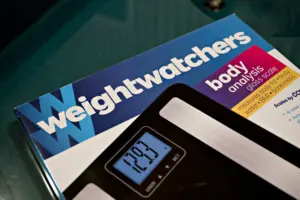 Earlier this year, Weight Watchers – the company long held up as the gold standard in smart and sensible dieting – filed for bankruptcy in an attempt to restructure more than $1 billion in debt. After decades of selling Points and promises, it seems even relentless rebrands couldn’t keep up with their dismal long-term success rate or the rise in popularity of prescription weight loss drugs.
Earlier this year, Weight Watchers – the company long held up as the gold standard in smart and sensible dieting – filed for bankruptcy in an attempt to restructure more than $1 billion in debt. After decades of selling Points and promises, it seems even relentless rebrands couldn’t keep up with their dismal long-term success rate or the rise in popularity of prescription weight loss drugs.
Though I haven’t attended a WW meeting in years, have long since deleted their app, and have moved on from trying to micromanage my life into points and “free” foods, when I read the headlines, I found myself strangely emotional. It was like hearing that the house I grew up in had burned to the ground – while no longer relevant to my life, the memories run deep.
The Personal Cost: A Childhood Shaped by Shame
I was six years old the first time I attended a Weight Watchers meeting with my mother. Yes…six. While most kids were learning to ride bikes or spell, I was learning about “exchanges” and “red-light foods.” At that first meeting, the woman who weighed my mother looked me up and down and spelled something that started with an O, and on the car ride home, I vividly recall asking my mother what she was spelling. Without yet having the vocabulary to articulate it, I had already internalized the shame around my body and size and knew the front desk lady was calling me fat. And though I wasn’t allowed to be a member at that young age, it was that shame that kept me hooked on Weight Watchers’ failed system for decades. I just need to try harder and buckle down this time, I would tell myself, repeatedly.
I wasn’t just a casual Weight Watchers consumer. I joined over 35 times throughout my lifetime. I believed.
I went to Weight Watchers camps as a kid – summer camps with sing-alongs and scales – where we got weighed every week and were given a membership to attend meetings when we got home. The message was clear: my body was a problem to be solved, I should not trust my innate understanding of how to feed myself, and their system will show me the way.
Over the years, I rode every wave of the company’s many reinventions: the original exchanges plan, where eating fish 3-5 times a week and liver once a week were doctrine. The Points system, which felt like freedom until you realized you could blow your entire day at breakfast and be left eating celery for dinner, or eventually, like me, gaming the system by starving all day to afford a “legal” binge at night. The gloopy frozen dinners, the weird smelling packaged foods, the overly sweet pre-portioned cookies. The era of zero-point fruits and vegetables, when we were told, essentially, that all fruits were “free.”
The Fatal Flaw: Why Weight Watchers Failed
Eventually, I left all that behind when I began a diet focused on metabolic health rather than counting points in a last-ditch effort to avoid bariatric surgery. A few years into my journey to good health, I was wearing a Continuous Glucose Monitor (CGM) and decided to experiment with an apple. I watched my blood sugar spike up nearly 60 points from that one piece of fruit – and crash shortly after, leaving me shaky and starving. Oh my. It was like someone put my decades of failure under a microscope and brought it into sharp focus: This is why I could never make Weight Watchers work. Exactly this.
It wasn’t because I lacked willpower, but because human biology does not align with the program’s everybody-can-eat-every-thing philosophy. That was the myth, the fatal flaw upon which all else ended up tainted – as if moderation were a switch we could flip, as if we all don’t have brains hard-wired to preferentially reward the carb-fat combination, as if we all don’t carry different levels of insulin resistance, dopamine responses, trauma, and physiology that make “just have a little” feel like a cruel joke.
I didn’t understand then what I know now: that biology matters, that food affects us in deeply individual ways. No one ever explained this to me, to any of us who sat on those uncomfortable metal chairs in the endless stream of Weight Watcher meetings. No one ever said any of that.
And so, every time I failed, I blamed myself. Not the system. Not the questionable science. Me.
I cannot begin to count the hours I’ve spent trying to contort myself into that mold, white-knuckling through hunger, feeling broken for not being able to make it work, and then inevitably, crawling back to rejoin. This time will be different, I’d think with the same hopeful delusion of a gambler heading to the casino ATM at 3am.
And so yes, when I read the news that the company was collapsing under its own weight, I felt more than a flicker of grief, not for the brand, but for all the versions of me that lived inside it:
The 400-pound woman who woke up every day trying to figure out how to lose weight, who believed she wasn’t trying hard enough and thought failure was a personal flaw, not a systemic one;
The teenager who thought being smaller would make her lovable and worthy;
And the six-year-old little girl who was judged for her body at a brutally young age, and who took on that shame, with compounding interest, for decades.
Life After Points: Reclaiming Health, Trust, and a New Path Forward
Weight Watchers is dead. And it’s about time.
Because they didn’t just take my money over and over again, they took my trust and dismantled my relationship with food. They taught me to fear and obsess over food, to chase smaller, to measure my worth in Points and pounds. To wear shame like armor.
Weight Watchers spent fifty years embedding itself into our culture, not just selling weight loss, but reshaping how we think about food, bodies, and ourselves.
Blame, however, does not fall solely on one company’s shoulders, it falls on the perfect storm of government guideline failures, academic dogma and industry-interest. But if you spun together all three of those things to create their lovechild? It would most assuredly look like that fluorescent-lit, second-floor Weight Watchers meeting room where we would get applause for shrinking or feel panic over a fraction of a pound gained.
No, I’m not surprised Weight Watchers is filing for bankruptcy, I’m shocked it took so long.
I wish I could say for sure that this is the end of a cultural legacy of harm, but when I see the way weight loss medications are now being marketed, I don’t feel all that confident, with the current rhetoric cycling the same old tropes about thinness and moderation.
It is not that GLP-1 medications are wrong or bad, if you are working with a trusted medical professional who also provides education and support along with their prescription, but the insanity of getting a powerful medicine after filling out a 30-second questionnaire on Instagram? This is diet culture cosplaying as “wellness,” and another entire generation will be left to untangle the mess.
So, I won’t lie. I am torn, but…I’m also profoundly hopeful and thankful.
Today, I have the immense privilege of working at Toward Health, a medical practice on the leading edge of metabolic health, where we use remote technology, education, and deep, individualized understanding to help people reclaim their lives. It’s not just a job; it’s personal. This practice has helped me transform my own life and lose over 200 pounds by restoring my trust in my body and repairing a metabolism broken by decades of dieting. The approach is based on rigorous evidence and data rather than gimmicks, with nearly a dozen peer-reviewed papers validating the efficacy of our programs, especially our employee wellness initiative.
Now, we can begin to write a new story, create a new system – one rooted in awareness instead of control, in compassion rather than blame. In science and knowledge, not willpower. In sanity rather than shame.
All those years of “failing” on Weight Watchers? They brought me here. To my work alongside a team of people helping build what I wish had existed all along, what I really needed all those years ago.
Because if there is one thing I now know after five decades in the trenches of dieting, it is this: We were never the problem. The system was.
Weight Watchers is dead. Let it rest in peace.
It’s time for something better to take its place.
Toward Health offers programs that address the root causes of weight and metabolic issues. Book a call to learn more.




